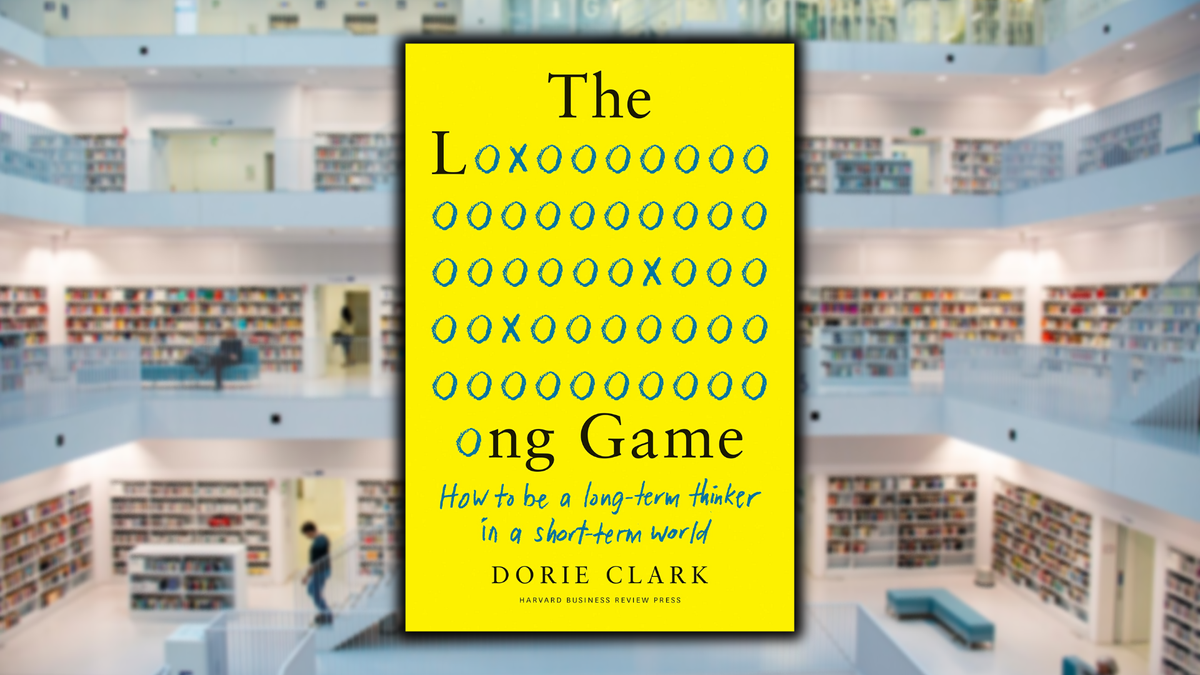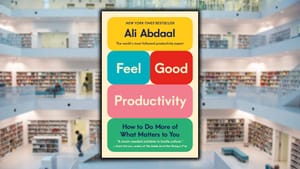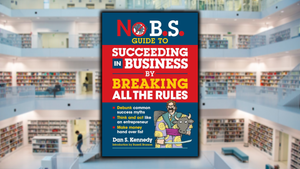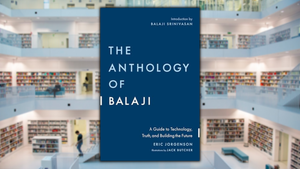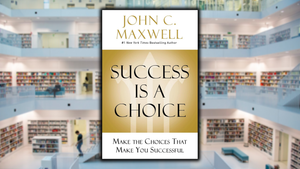
Summary:
This Book is For:
- Creative professionals who are just starting out in their careers, looking to change fields, or who are simply feeling stuck.
- Business leaders looking for an edge over their competition.
- People who feel trapped in their current circumstances and who want to break out into a larger, more fulfilling life where they are more in touch with their higher selves.
While the rest of the world thinks we're playing checkers, readers of this book will know that we're actually playing chess instead. The greatest Grand Masters in chess plan many, many moves ahead, and the best players in the game of life tend to do the same thing. That's what The Long Game is all about.
The modern world, however, continues to prioritize short-term gratification over long-term success and fulfillment, and we see evidence of this everywhere. There are the consumer and student debt crises, with people owing thousands of dollars (and sometimes much more) on their credit cards due to poor planning and impulse shopping. There are the billions of hours being wasted each day on mindless social media scrolling and the obesity epidemic overwhelming our healthcare systems worldwide.
What it boils down to is people taking the easy way out, doing what feels good in the moment but leads to nothing but trouble and dissatisfaction in the long term. As they say, "Hard choices, easy life. Easy choices, hard life." Keeping the end in mind and making good short-term decisions is hard, but it's nothing compared to the hardship of looking back on your one and only life with regret.
Dorie Clark, the author of The Long Game, has been named one of the Top 50 business thinkers in the world by Thinkers50, was recognized as the #1 Communication Coach in the world by the Marshall Goldsmith Leading Global Coaches Awards, and she's also a frequent contributor to Harvard Business Review. So she knows a thing or two about a thing or two when it comes to playing the long game. She's been at it for a while!
In this book, she doesn't claim that the hard path is the only correct path, but she does explain that we have to be intentional about how we structure our choices and prepare a long-term plan for our careers and lives. She also shows readers how to enjoy today, because you'll have greater confidence that you're on the right path, instead of scrambling from one imminent deadline to the next, never lifting your head above water for long enough to do any effective planning.
Creating the white space in our lives necessary in order to step back and take in the whole picture is one of the goals of this book, and she presents a ton of high-level concepts to help you make this kind of thinking more common in your daily life.
Of course, anyone who wants to start playing the long game is also going to face unique challenges, and she gives us several useful strategies to help us combat these challenges as well. For one thing, it takes courage to resist the same kind of short-term thinking that predominates in the wider culture. It's also challenging to stick to one path without seeing visible results for a long period of time, which is basically par for the course when the accomplishment of your goals takes years to materialize instead of days.
Your personal goals need a long-term strategy, though, and this book will help you craft one for yourself. It will encourage you to "think in decades" and help you to think bigger. In this breakdown, we're also going to cover several extremely important ideas such as strategic patience, raindrops of success, and more. We're going to uncover the truth about ridiculous goals and how to tell if what you're doing right now is working.
We're going to see how we can create opportunities for ourselves that give us "two ways to win, and no way to lose." We're also going to internalize the power of compound interest, and clear the chessboard with devastating long-term moves that the other players never saw coming.

Key Ideas:
#1: Thinking in Decades:
“We radically underestimate what we can accomplish in a decade.”
Bill Gates once said that we tend to overestimate the amount of change that will occur in the next two years and underestimate the amount of change that will occur in the next ten. That same idea is basically the premise of this whole book, and it's an extremely powerful one.
Once your time horizon - the length of time you're willing to commit to becoming successful - becomes extended, everything else about the way you live your life can change too. It helps takes some of the pressure off of you in the short term and it expands your possibilities in the long term. We're playing chess here, not checkers!
Ten years is a long time for radical accomplishment, but since human beings don't tend to do so well with internalizing larger numbers, we tend to ignore that fact. We have difficulty visualizing how long ten years actually is, and so we need reminders of our own capacity to change the trajectory of our lives. The Long Game can serve as this crucial reminder.
Clark suggests learning how to "think in decades" and expand our own personal timelines for success. This will help us not only to think strategically but also to think bigger as well, since we're not pressuring ourselves anymore to be uber-successful by the beginning of next week.
#2: Setting Realistic Timelines:
It often takes 2-3 years of sustained work before you see noticeable progress, at least in most endeavors. Yes, you're certainly going to win small victories during that time (small "raindrops of success", as Clark calls them), but it's going to take much longer than you may expect in order to "make it." That's just the reality, and it's a reality the brute force of which stops too many people in their proverbial tracks. They quit because it's just too hard. It takes too long.
To become a recognized expert, moreover, you should expect at least five years of consistent effort. Five years! Five years until you become a recognized author, YouTuber, lawyer, salesperson, artist, etc. They say that overnight success takes at least ten years, and there's some truth in that statement for sure, but you should be willing to invest at least half that much time in your chosen endeavor before you give in and give up.
Clark also notes that people revisit their strategy too often - if they even have one to begin with - when instead they should continue to follow their action plan. It's the same old story of the entrepreneur who puts up 300 flyers around the neighborhood, gets no customers, and concludes that it's time to quit. Meanwhile, in the next city over, there's another entrepreneur who's put up 30,000 flyers, gets 10 new customers, and then gets to work.
#3: The 7-Year Time Horizon:
“If everything you do needs to work on a three-year time horizon, then you’re competing against a lot of people. But if you’re to willing to invest on a seven-year time horizon, you’re now competing against a fraction of those people, because very few companies are willing to do that. Just by lengthening the time horizon, you can engage in endeavors that you could never otherwise pursue.”
-Jeff Bezos, CEO of Amazon
#4: The Thing About Ridiculous Goals:
“The whole point of playing the long game is understanding that ridiculous goals are ridiculous right now – not forever. When we force ourselves to take our goals to extremes – What would ultimate success look like? – we can create an honest road map for ourselves. It might take five years, or ten, or twenty. But that time will pass anyway. If a goal is worth pursuing, it’s worth pursuing the version of it we actually want – not one that’s watered down to protect our ego.”
-Dorie Clark
#5: How Can You Tell If It's Working?
“In the moment, it’s impossible to tell whether it’s not working or whether it’s not working yet.”
Going to the gym once or twice won't tell you whether your current workout program is working or not; just like writing one chapter of your book won't tell you anything about its possible reception by an actual audience. You have to ship. Then you have to wait. And then you have to repeat that process over and over again for however long it takes!
The key is to set a reasonable timeline, as discussed above, but you also need a deadline and benchmarks, not to mention at-bats, all of which we'll discuss presently.
A wise path here is to give yourself enough time to accumulate at-bats (reps, tries, attempts, etc.), but also to set a deadline at which point you will pause to evaluate your progress.
Ten years is a healthy expectation when it comes to generating a million dollars in personal income through a business, for example, but you can't keep stringing yourself along for ten years while you pretend that what you're doing is working. You need to give yourself a deadline like, "If I can't generate a sale within 90 days, then I'll start looking for a different business to start."
Persistence is a virtue, and 50 people in a row can be wrong about you, but if 1,000 people in a row tell you that your product sucks, then it probably sucks. Not a problem though! Just pivot and take a different approach, perhaps with a different (and better) product!
The more at-bats you have, though, and the more attempts you make, the more progress you'll make, and this constant improvement will keep operating in the background until you've honed your skills, improved your product, and leveled up your marketing to the point where customers will begin to buy from you, publications will begin to publish your work, and you gain traction in your career.
Another extremely important thing you need to start getting at this stage is feedback. Ask customers why they're not buying your product; ask editors why they are rejecting your piece; ask your viewers what they like about your videos, and use all that information when you go back to work.
#6: Strategic Patience:
“What I’ve come to love about patience is that, ultimately, it’s the truest test of merit: Are you willing to do the work, despite no guaranteed outcome? We earn our success by toiling without recognition, accolades, or even any certainty that it’s going to come to fruition. We have to take it on faith and do it anyway. That’s strategic patience.”
-Dorie Clark
#7: Creating White Space for Thinking:
It's a noisy world out there, and most people are simply afraid of silence. I don't normally like to say "most people," but in this case, I may be right. People everywhere are always in flight from themselves, escaping off into noise and distraction instead of coming home to themselves and seeking silence within.
But in order to do any long-term thinking whatsoever, you simply must become comfortable with silence. This book right here may help, but a critical step you need to take is to clear the space for silence in your own life.
Clear the time-space so you have a free minute (or 60) to think; clear the mind-space so that you can focus on formulating a clear plan instead of being tossed around on the current of your thoughts; and create the financial space, so that you're not so worried about bills that you can't afford to think strategically in longer timescales. These are all important types of space that you need to cultivate if you want to become a long-term thinker.
#8: Control Your Calendar:
“If you have free time in your calendar, unless you guard it vigilantly, it will get devoured.”
Tasks and requests abhor a vacuum, and in today's world, your calendar is your castle; you have to defend it at all costs, because there will be people and tasks that will try to take your free time from you if you're not careful.
Everyone says that you have to learn how to say no if you want to take control of your calendar, but what often gets missed is the fact that we're also going to have to learn how to say no to things that we actually want to do. It's easy to say no to things that are obvious timewasters, but the finitude of human existence means that we are forced to say no to good things as well, which definitely hurts.
As they say, a schedule is a net for catching days, and if you just throw your time away to anyone who asks for a little tiny piece of it, you're going to get to the end of the day - and possibly your life - asking where it all went.
So, it helps to schedule the most important things first, and then schedule everything else around them. That way, you know for certain that you have made space in your calendar for what's truly important to you - or, at least, your highest current priorities - and then whatever else doesn't get done just doesn't get done.
Also helpful here is to use a "Done" list, as opposed to a "To-Do" list. I use both, but I find that they're both good for different things. Having a To-Do list puts everything that you've got going on right in front of you where you can't miss it. It's an "Inbox" where you can collect all of your tasks and responsibilities so you don't miss anything. I find that incredibly helpful.
But what a "Done" list does is help you to think in terms of results and action. It's extremely satisfying to move tasks onto your "Done" list as you complete them, and you can even turn it into a little game where you try to increase your productivity from one day to the next.
Make sure to keep referring to your calendar though, and to avoid unrealistic expectations when it comes to what you're able to accomplish in a single day. With the possible exception of that guy with all the rockets, we're all human, and as Dorie Clark says:
“If you start operating from the calendar rather than a to-do list, you take back control over your day.”
#9: Optimize for Interesting:
Knowing what you "should" be working on is exceptionally difficult to figure out, and it often strikes me as unusual that we ask 19-year-olds who have seen exactly 0% of the world to decide what they want to do and be for the rest of their lives before they're even old enough to drink. Isn't that crazy?
Even if you reach the age of 100, you can consider yourself fortunate if you've explored even 0.000001% of the awesomeness that the world has to offer. So it all becomes very confusing very quickly when we ask ourselves what we think we should be doing in our careers, regardless of our age.
There are literally thousands of careers that you could pursue, and new ones are popping up all the time as old jobs are disappearing. You never hear about kids learning to become cobblers anymore, but "YouTuber" is a career that most people would never have even considered just 10 years ago. Now it's a legitimate profession. So what can we do?
Part of the solution, says Clark, is to "optimize for interesting." That means to follow your curiosity wherever it leads and to make sure that, whatever you do, you're bound to come away with a fascinating, useful experience. It's similar to the "two ways to win, no way to lose" concept we cover next in Key Idea #10.
It means that when faced with three similar jobs that pay the same or are otherwise similar, choose the one that's going to challenge you the most, provide the greatest opportunities for growth and advancement, and the one that you're likely to find the most interesting.
#10: Two Ways to Win, No Way to Lose:
“Make sure that even if you lose, you still win.”
The Key Idea here is that, when approached intelligently, you can always at least derive some benefit from almost any activity, even if you may end up "failing" at the main goal of that activity. I'll give you an idea here of what I mean.
I'll use myself as an example here, specifically, my time spent working as a nightclub bouncer in Canada. Most people would hate this job. And perhaps not surprisingly, it doesn't pay all that well. So in terms of "making a living," I looked pretty unsuccessful to the outside world. But I was always okay with that because, for one thing, some of the best times of my life happened at that bar. If nothing else, I would have made memories to last a lifetime, and I will never, ever regret that. Not for one minute.
But what that job also allowed me to do was to gain experience talking to literally tens of thousands - maybe even hundreds of thousands - of people, including angry drunks that I had to learn to negotiate with, attractive women I wanted to persuade to go on a date with me (mission accomplished hehe), as well as a ton of other people that taught me how to be a great listener, get along with people, stand up for myself, and more.
So you can see that I was winning in all these different ways, while most people would just look at the paycheck and conclude that that job wasn't for them. I've used this strategy so often in my life and it's always worked!
My overnight security job allowed me to read more than 1,000 books and led me to start the Stairway to Wisdom; writing on Medium is improving my writing skills, as well as paying me to write and helping me to build my network; recording videos for my YouTube channel is teaching me how to be better and more relaxed on camera, how to edit videos, how to structure a compelling story, etc.
That was three whole paragraphs about me, which I rarely do, but you get the picture! Now, look at your own life and goals - specifically, your 10-year plan - and look for opportunities where you might have multiple upsides and few downsides.
Set up your life so that you profit from everything, regardless of what happens. You may or may not become a world-class speaker, or lead a successful sales team, or whatever else, but the skills you pick up along the way no power on earth can ever take away from you.
#11: Give Yourself At-Bats:
“You have to be excellent and you need at-bats.”
We discussed this a little bit in Key Idea #5, but there are a few other important things here that I want to point out and that Dorie Clark explores in her book. The first is that an increased number of attempts (at-bats) will give a better indication of whether someone's success is attributable to luck or skill.
Even world-class performers fail much of the time (in Major League Baseball, a batting average of .300 is considered really good), and people who are god-awful at what they do can always get lucky once or twice and appear to be excellent. However, over time, there is a regression to the mean; world-class performers prove themselves more often than not, and charlatans get exposed.
The upshot here is that it's entirely possible that you have the potential to become world-class, but you'll never know if that's true unless you put in the consistent effort over a long enough period of time!
You don't know that you can't write, because you haven't written 1,000 articles yet and tried to get them published online. You don't know whether you can become a popular YouTuber, because you haven't posted 1,000 videos yet. You haven't asked 1,000 people out on a date, or pitched your product to 1,000 customers, or whatever else.
To succeed over the long term, you need to be excellent at what you do. That is the brick wall against which get-rich-quick schemes smash into a thousand pieces. But in order to become excellent at what you do, you need to work, hard, over a long enough period of time, receive feedback all the time, and then use that feedback in order to improve even further. It's not just the hard work, but the consistency of the hard work, that causes most people to fail. But now, because you've learned this lesson, that's not going to happen to you!
#12: The Compound Interest of Success:
“The rate of payoff for persevering during those dark days isn’t linear. It’s exponential.”
Human beings have great difficulty understanding compound interest and exponential growth. For example, most people forget that Warren Buffet only became a millionaire in his thirties, a billionaire in his fifties, and that he made most of his money after the age of 60 - and he's been investing since he was a child!
What that means is that for a long, long time - most of his life, actually - Warren Buffet wasn't a billionaire. It happened slowly, and then it happened all at once. Most growth is like this, and there's a "hockey-stick" shaped growth pattern that appears over and over again in varied domains. There's no (visible) progress for a long, long time, and then growth accelerates straight up and you have the "overnight success" that took ten years.
It's true that you get out of life what you put in, but once you've taken care of the inputs, you honestly just have to wait! Well, actually, you also have to keep pushing and grinding the same as you've always done, but you have to trust that your intelligently-directed efforts will bear fruit and that exponential success is building up behind the scenes.
I mean, how bad do you really want it if you're not willing to wait strategically for as long as it takes the mathematical laws of the universe to catch up? You're really just gonna work hard for a year or two and then give up because you're not automatically a millionaire or a world champion?
Nature doesn't make mistakes, but it can take an extremely long time to produce results. Take the example of a caterpillar. For 9-14 days, all you can see is the chrysalis, with the butterfly patiently waiting for its moment to emerge. At any point during those first 13 days, an outside observer wouldn't be able to tell that anything was happening. But on that very last day - in the last 7% of the timeline - the world is blessed with the butterfly that was on its way all along.

Book Notes:
“The challenge for all of us is an inner one: to keep going when it seems like no one is paying attention or cares. And to believe that eventually, the world will catch up.”
“In life, we just don’t know what’s going to happen or how things will play out. But if it’s important enough, we have to try anyway.”
“When you give yourself permission to work long hours, to work continuously, you allow these little systemic, strategic inefficiencies to crop up all over the place.”
-Dave Crenshaw
“When you start with parameters like ‘I’m going to take all of July off,’ or ‘I’m going to finish work by six o’clock every night,’ it forces you to be creative in the systems you develop.”
“Everyone has a basic sense of how long something will take. The problem is, their estimate is often wildly inaccurate. It may sound innocuous to agree to present a free webinar, because it’s only an hour long. But if you add up the planning calls, the messages back and forth, the run-through, and creating the slides, you’re looking at three to four hours of work.
If you consistently underestimated the time or money needed on your company’s work projects by a factor of four, you’d likely be out of a job. But we do it all the time in our own lives, and rarely even recognize the problem. For every request, think through each step – including hidden or unstated obligations – and create a rough estimate of what’s actually involved. That alone may scare you into saying no.”
Four Questions to Help Decide If Something Is Worth Doing:
*What is the total time commitment?
*What is the opportunity cost?
*What’s the physical and emotional cost?
*Would I feel bad in a year if I didn’t do this?
“Part of playing the long game is understanding that you can’t always immediately jump into the ring. Moving slow may feel like wasting time. But every moment you spend understanding the nature of the game, and how it works, makes you stronger once you do get in.”
“People are busy, so you need to give them a reason to pay attention to what you say. Social proof – your demonstrated credibility – is a quick way to do that.”
“Waiting a year to ask for any favors prevents anyone from inferring that you have an agenda. And frankly, it stops you from having one, even subconsciously. It lets you step back and concentrate on building a genuine friendship.”
Pro Tip: Whenever you receive a request that's likely to be time-consuming and you're not sure whether or not you actually want to do it, ask the person making the request for additional information about what they're looking for. Many people won't follow up, and others who do follow up will be clearly unprepared. You can easily ignore those requests. Then you're only left with the requests that are likely to be win-win in some way.
“If you do good things with good people, then good stuff always seems to come.”
“When you connect to others with an infinite horizon – no agenda whatsoever other than being helpful and deepening your relationships with interesting people – that’s how opportunity happens.”
“It’s so easy to forget what we’ve accomplished. And when we do, we lose sight of the powerful fact that if we’ve done it before, we can do it again. With effort and enough of a horizon, almost anything is possible.”
“We have to be willing to do hard, laborious, ungratifying things today – the kinds of things that make little sense in the short term – so we can enjoy exponential results in the future. We have to be willing to be patient. Not patient in a passive, ‘let things happen to you’ way, but actively and vigorously patient: willing to deny yourself the easy path so you can do what’s meaningful.
The results won’t be visible tomorrow, when the progress you’ve made may be imperceptible. But they will be visible in five or ten or thirty years, when you’ve created the future you’ve always wanted.”
“If one hundred people reject your work, that’s a pretty clear message. But one or two or ten? You haven’t even gotten started.”

Important Insights from Related Books:
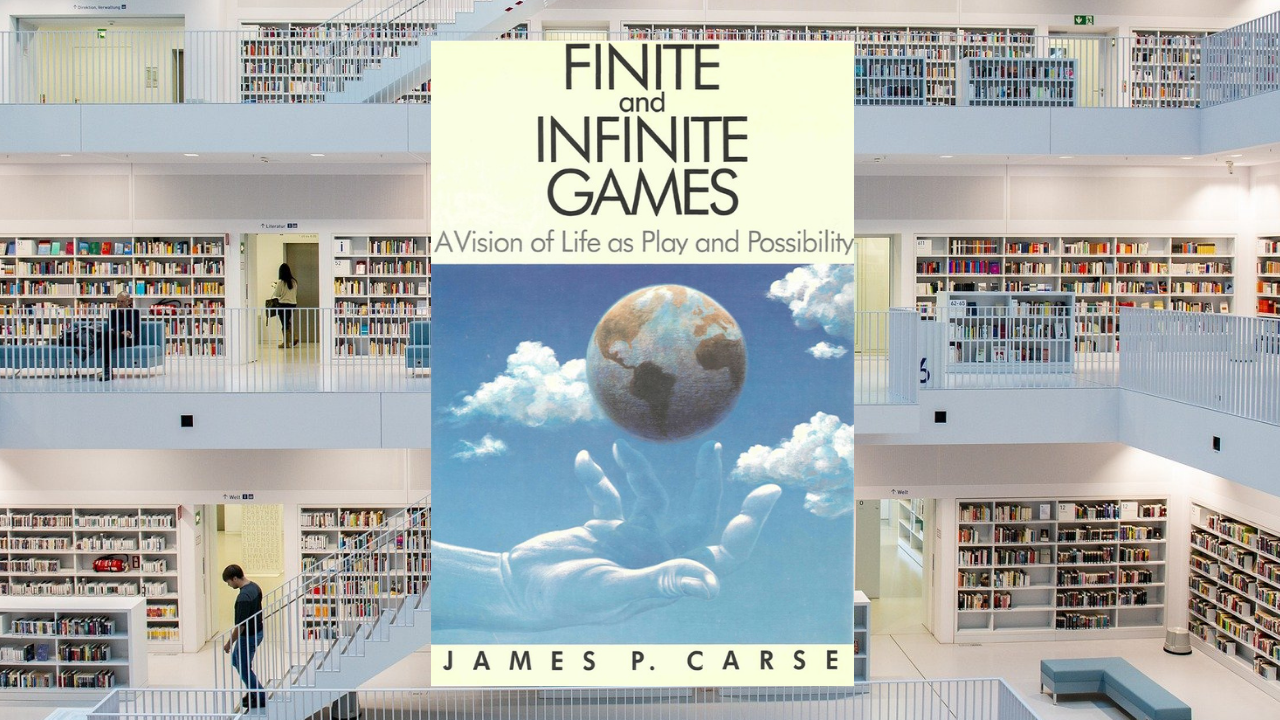
Finite and Infinite Games, by James P. Carse:
This is a difficult book to summarize, but the basic idea is that finite games have winners and losers, whereas the goal of infinite games is to keep the game going, to extend the play.
A finite game would be a boxing match where there is usually one clear winner and one clear loser, whereas an infinite game would be the pursuit of knowledge for its own sake, working out, painting, etc.
You can't "win" at painting, you can only get better. You'll never learn all that there is to learn, so you could conceivably go on forever. Infinite games are games you play for the long term.
“Strength is paradoxical. I am not strong because I can force others to do what I wish as a result of my play with them, but because I can allow them to do what they wish in the course of my play with them."
“My freedom inherently affirms yours.”
“There is but one infinite game.”
This Book on Amazon: Finite and Infinite Games, by James P. Carse
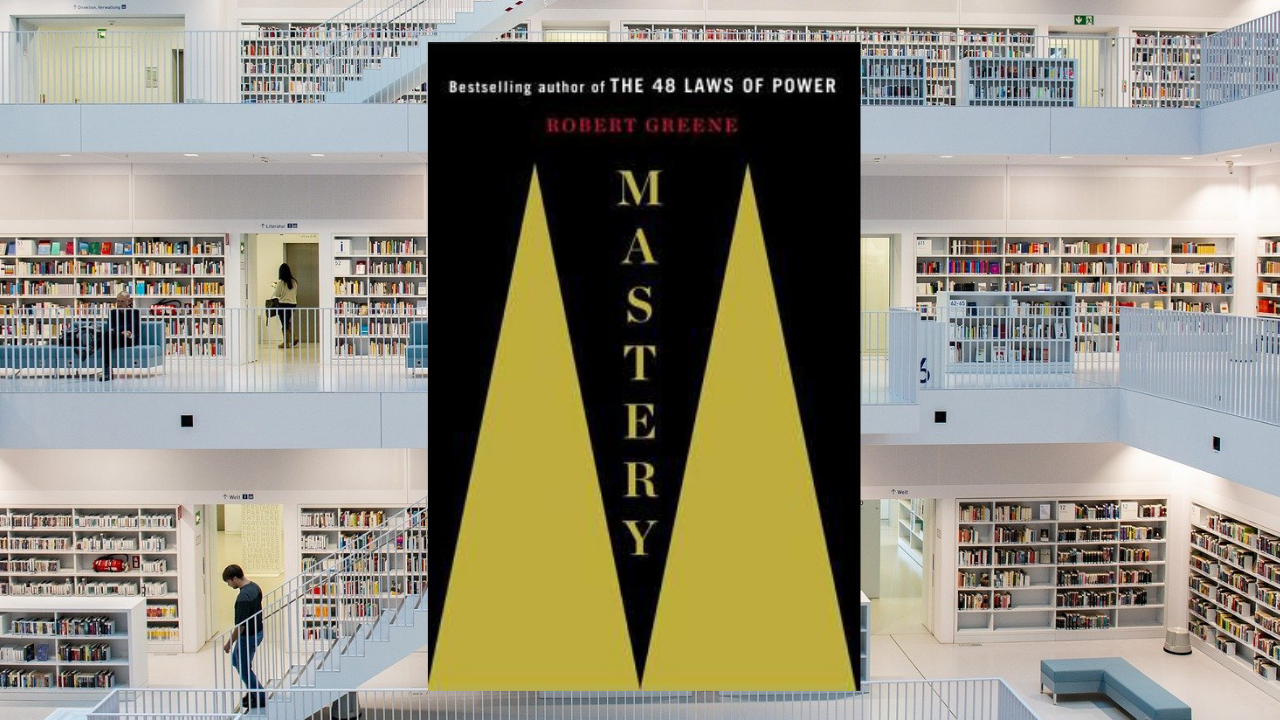
Mastery, by Robert Greene:
If you want to become extremely good at something, and you don't mind committing the next 10-50 years of your life towards mastering it, then read this book. We are big fans of Robert Greene here at HighExistence, and this is the book you want to read if you want to discover the secret to greatness.
In Mastery, Greene analyzes the lives of masters like Albert Einstein, Leonardo da Vinci, Paul Graham, and many more to find out exactly how they became so spectacularly skilled in their chosen fields.
“Think of it this way: There are two kinds of failure. The first comes from never trying out your ideas because you are afraid, or because you are waiting for the perfect time. This kind of failure you can never learn from, and such timidity will destroy you. The second kind comes from a bold and venturesome spirit. If you fail in this way, the hit that you take to your reputation is greatly outweighed by what you learn. Repeated failure will toughen your spirit and show you with absolute clarity how things must be done.”
“The future belongs to those who learn more skills and combine them in creative ways.”
“The time that leads to mastery is dependent on the intensity of our focus.”
This Book on Amazon: Mastery, by Robert Greene
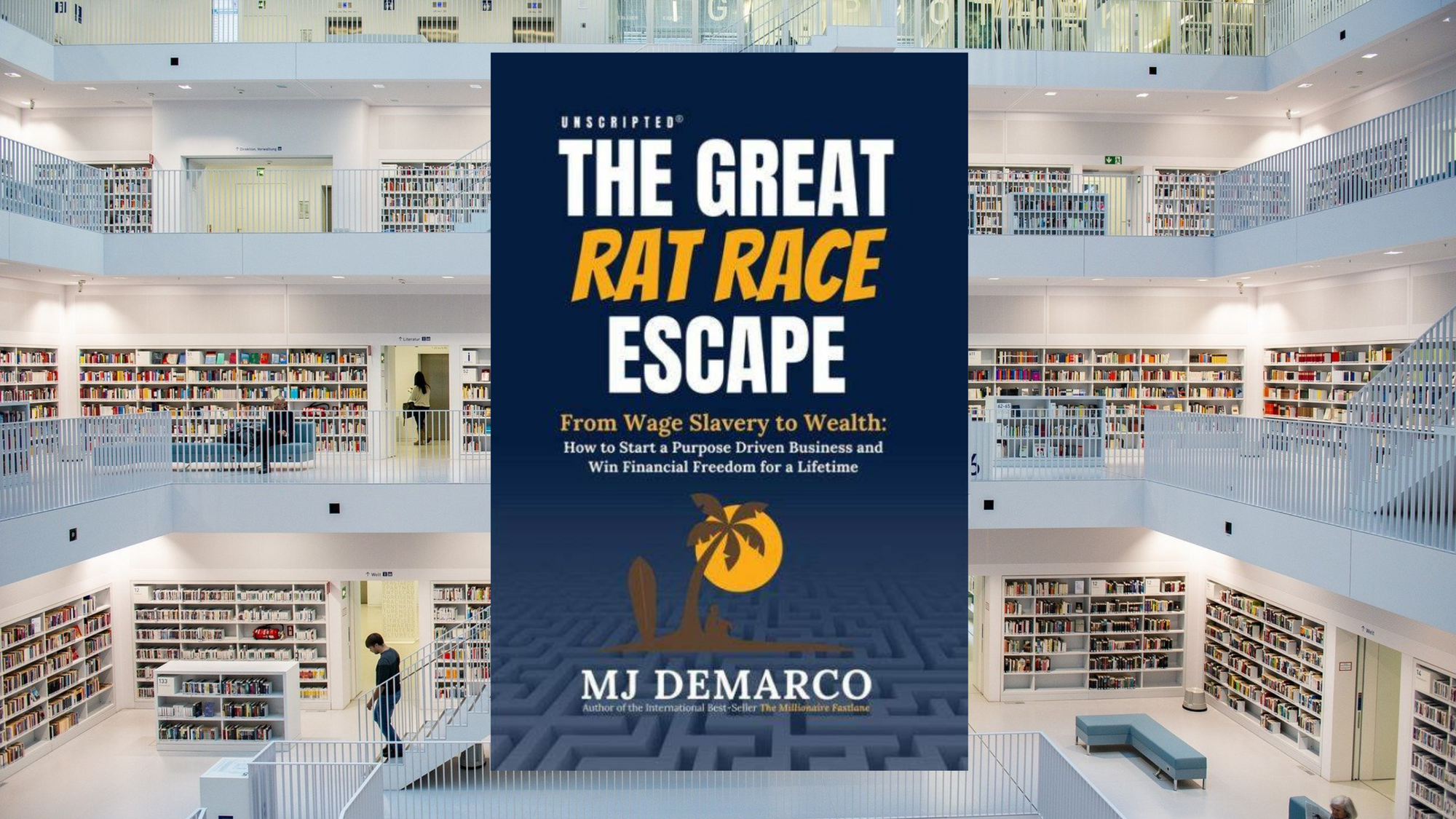
The Great Rat Race Escape, by MJ DeMarco:
The Great Rat Race Escape blasphemes against the current “economic religion” of the world, which tries to convince people that they “wouldn’t be too unhappy” working away for 40+ years at a job that they “kinda-sorta like” (or, in many cases, passionately loathe), just so they can maybe - hopefully - get their freedom back fifty years later when they can finally enjoy their money from the safety of the nursing home.
That sounds like a waste of a perfectly joyous life to me, and M.J. DeMarco teaches how we can avoid that fate by starting a business and taking advantage of the internet gold rush that we’re currently experiencing. The creator economy is absolutely booming right now, new businesses are appearing all the time, entrepreneurship is “hot,” and our time is now.
“Our culture thrives on mediocrity and obedience. It is the world’s business model.”
“Anything that can be improved is a business opportunity.”
“Never live within the parameters of someone else’s opinion unless you want to live within the parameters of their existence.”
Read the Full Breakdown: The Great Rat Race Escape, by MJ DeMarco
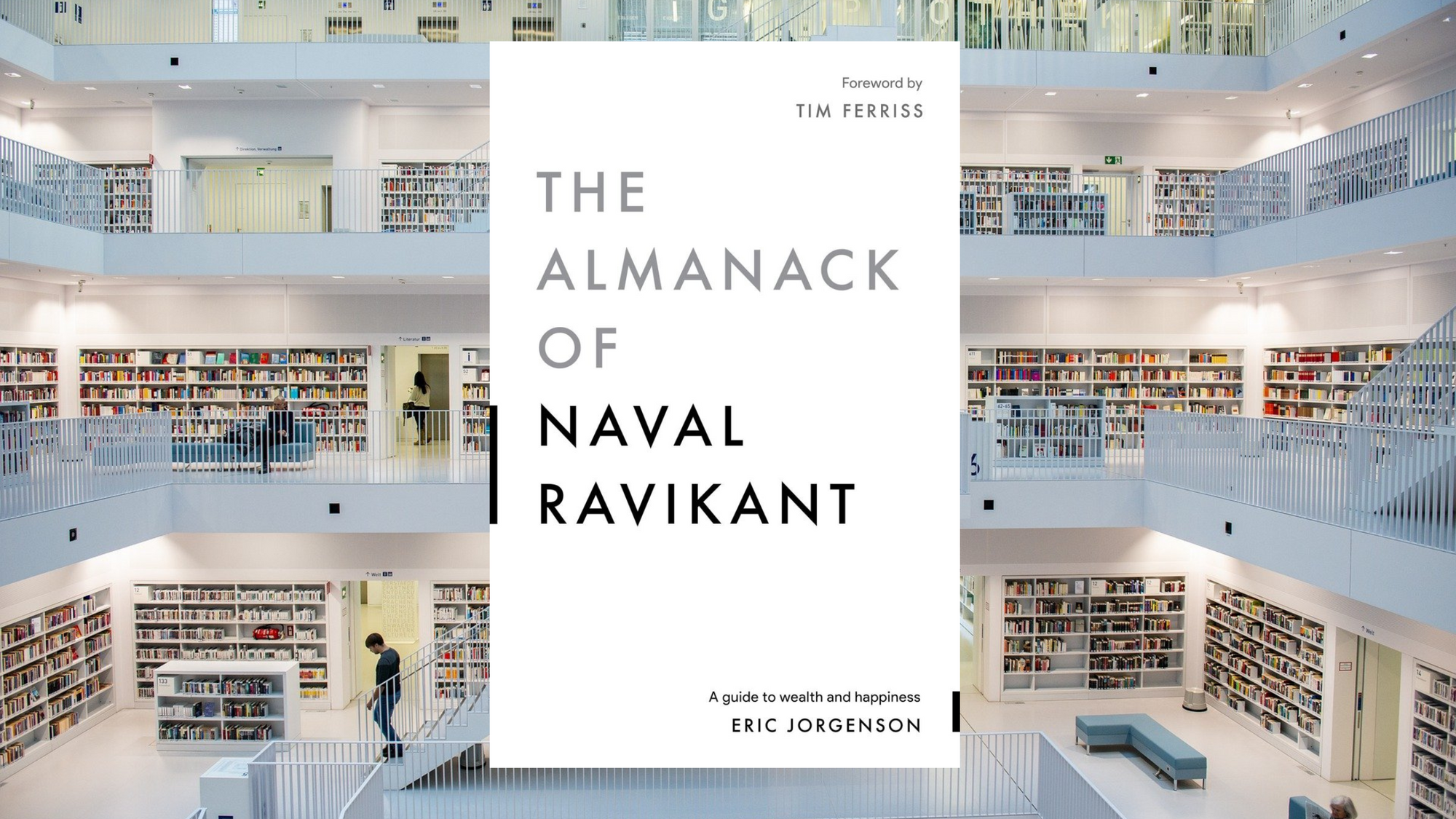
The Almanack of Naval Ravikant, by Eric Jorgenson:
One of the biggest takeaways from the book is the emphasis on leveraging specific skills - skills that you can't be trained for. If there's something that you can be trained for, someone else can be trained to replace you, so you have to cultivate specific, valuable, domain-specific knowledge if you want to be maximally rewarded in the marketplace. This means doing something so well, so creatively, so remarkably that someone else can't just "take a course" to do what you do.
Naval is the founder of AngelList, a website that allows startups to raise money from angel investors free of charge, and he's had over 70 successful exits himself, after investing in companies like Uber and Twitter before almost anyone else. This book is jam-packed with his best career advice and strategies for long-term, leveraged thinking.
“Learn to sell. Learn to build. If you can do both, you will be unstoppable.”
“Play iterated games. All the returns in life, whether in wealth, relationships, or knowledge come from compound interest.”
"If you're a perpetual learning machine, you will never be out of options for how to make money. You can always see what's coming up in society, what the value is, where the demand is, and you can learn to come up to speed."
Read the Full Breakdown: The Almanack of Naval Ravikant, by Eric Jorgenson

The View from the Opposition:
No one's ideas are beyond questioning. In this section, I argue the case for the opposition and raise some points that you might wish to evaluate for yourself while reading this book.
#1: You should ask for help more often, even from people you just met.
First off, I absolutely love the idea of "no asks for a year." It helps to take the sleaze out of networking (that dirty word) and really see the person we're connecting with as a human being first, not just someone who could be useful to us. But at the same time, in some cases, you have to strike while the iron is hot.
Most people want to help you, and the majority of them are just waiting for you to ask. I can see the "no asks for a year" thing helping people who may tend to err on the side of asking for big things all the time and who always make it awkward, but as long as you make the relationship as win-win as you can, and as long as the other person is getting something out of the relationship, I wouldn't necessarily use 1 year as a hard and fast rule. Great guideline maybe, but be flexible.
What if they retire within the next six months? Or change their contact info? Or become way busier? What if you lost your chance forever, when they were ready and willing and able to help you the whole time and you just never asked?
#2: There are shortcuts in business, and not everything has to take ten years.
Again, I love the emphasis on thinking differently than most people and prioritizing long-term strategizing. I really do think it's critical. But the 10-year path isn't automatically better or more virtuous than the 6-month path. The difference lies in the nature of the questions you're able to ask in each case.
The long game is about, "How would my goals - and my feelings towards them - change if I gave myself more time to achieve them?" And the other mindset allows you to ask, "What would have to happen in order to achieve this goal in 6 months?" Both questions are total reframes! They also each allow different answers to emerge, and different paths to the same goal. Asking how you would achieve the same thing faster can let you see pathways to success that just weren't visible before.
They're also not mutually exclusive, and you can ask both questions with respect to the same goal. Just don't use long-term thinking as an excuse for your slow progress towards your goals!
#3: You can just decide to be happy for a long time too.
Obviously, this book is quite achievement-focused, and I love that! I'm into huge goals and I love doing hard things. But not everything has to be about "success" and "making it," and whatever else. You can just sit back and enjoy yourself for 10 years and be exactly as valuable a human being as the next person.
This isn't a criticism of Clark's book, but I do think that it's important enough for me to mention it here. The intended audience for the book is clearly people who are achievement-focused, and that's cool! But if you're reading this breakdown and feeling behind if you don't have any huge goals that you're pursuing, I wouldn't worry about it. You don't have to "do" anything to be a worthwhile, infinitely valuable human being.
"The test of a first-rate intelligence is the ability to hold two opposed ideas in the mind at the same time and still retain the ability to function.”
-F. Scott Fitzgerald

Action Steps:
So you've finished reading the book. What do you do now?
#1: Celebrate your small wins.
We win all the time, but we rarely take the time to appreciate it. Dorie Clark calls these small wins, these first signals of success, "raindrops of progress," and training yourself to see them is an important first step.
Many of us get so hung up on getting to the "next thing" that we totally undervalue the utility of celebrating our small wins along the way. So before you do anything else, pick out a few things you've done right or made progress on this week, and remind yourself to "catch yourself doing things right" next week as well.
#2: Create a "Stop Doing" list.
To-do lists are great, and done lists are great, but one thing that can really help us clear up a lot of time on our schedules is a "Stop Doing" list. This is pretty self-explanatory, but it's important.
Pick a day - or make it today - and look for examples of things you spend your time on that aren't moving you forward or doing anything for you in terms of life satisfaction, health, and happiness. Then, stop doing those things!
Keep a list of such things, and resolve to stop doing them as often as you can. The beauty of this approach is that you don't have to do any extra work! You actually have to do less!
#3: Pick something to be bad at.
It's when we try to be great at everything that we start dropping the ball in a whole bunch of places. Human beings are amazing, but no single person is going to be great at everything. What you have to do is staff your weaknesses and hire people to pick up where your skills end.
For example, lots of YouTubers hire people to create their thumbnails, edit their videos, and do other admin tasks that the main creatives just don't have time for. Sure, they could try to do it all themselves, but it takes time to learn how to structure compelling YouTube videos and be great on camera, and if they tried to do everything on top of that it would be a disaster.
So in your case, pick a few things - at least one - to be bad at, and accept the fact that you're likely always going to be bad at that one thing. Me? I don't know how to ride a bike or skate, and I can barely swim. But I know what I'm good at, what I care about, and how little time I have to become the best I can be.
#4: Impose some creative constraints.
Parkinson's Law states that work expands to fit the time available for its completion, and it's scary how accurate this is. If you give yourself the whole day to do something, it's probably going to take the whole day, but if you set aside just 1 hour for it, then you'll probably be able to find a way to finish it in 1 hour. That's what I mean by creative constraints.
It also works on longer timescales, such as in the case of the superhuman productivity most people can call up if they know they have a vacation coming up!
Adding these creative constraints to your own projects and workflow can help you to focus, but they can also help you find better ways to do things. If you only have half the time to get it done, you're going to find a creative way to do it. Experiment with this in your own life!
#5: 10x your next 10 years.
If you have a goal in mind for what you want to achieve in the next 10 years, multiply it by 10. As Bill Gates observed, we tend to underestimate the progress that can be made in ten years, and odds are, you're selling yourself short. Screw that! Move through life at world-class, and demand more from yourself in all areas of your life.
10xing your goals may mean 10xing your inputs, or the amount of time and effort you have to put in, so make sure that you're ready for that type of commitment, but if you're holding back because of fear, there's no time for that!
Ask around and do some research about how long it took other people to succeed with similar goals, and pledge to commit at least that long to achieve your own.
About the Author:

Dorie Clark has been named one of the Top 50 business thinkers in the world by Thinkers50, and was recognized as the #1 Communication Coach in the world by the Marshall Goldsmith Leading Global Coaches Awards. She is a consultant and keynote speaker and teaches executive education at Duke University’s Fuqua School of Business and Columbia Business School.
Dorie is the author of the bestselling books Entrepreneurial You, Reinventing You, and Stand Out which was named the #1 Leadership Book of the Year by Inc. Magazine. She has been described by the New York Times as an “expert at self-reinvention and helping others make changes in their lives.” She is a frequent contributor to Harvard Business Review and is now the author of her latest book, The Long Game: How to Be a Long-Term Thinker in a Short-Term World.
Additional Resources:
Dorie-Clark.com - Official Website
A Free Strategic Thinking Self-Assessment
Become a Recognized Expert with Dorie Clark
The Long Now Foundation - Main Website
How to Brute Force Your Way to $1M Dollars
This Book on Amazon:
If You Liked This Book:
Entrepreneurial You, by Dorie Clark
Reinventing You, by Dorie Clark
The 7 Habits of Highly Effective People, by Stephen R. Covey
The Infinite Game, by Simon Sinek
Finite and Infinite Games, by James P. Carse
